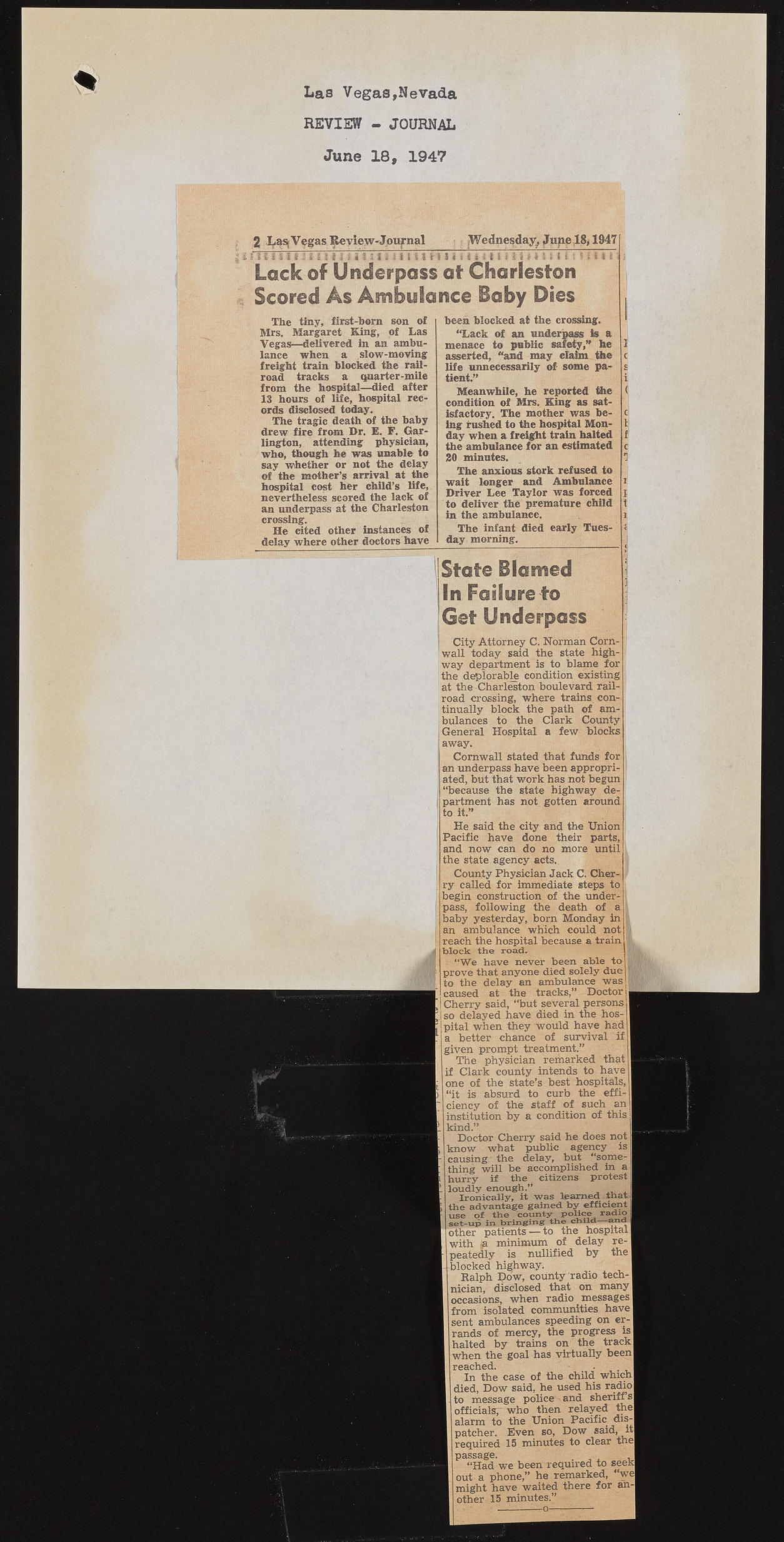Copyright & Fair-use Agreement
UNLV Special Collections provides copies of materials to facilitate private study, scholarship, or research. Material not in the public domain may be used according to fair use of copyrighted materials as defined by copyright law. Please cite us.
Please note that UNLV may not own the copyright to these materials and cannot provide permission to publish or distribute materials when UNLV is not the copyright holder. The user is solely responsible for determining the copyright status of materials and obtaining permission to use material from the copyright holder and for determining whether any permissions relating to any other rights are necessary for the intended use, and for obtaining all required permissions beyond that allowed by fair use.
Read more about our reproduction and use policy.
I agree.Information
Digital ID
Permalink
Details
Member of
More Info
Rights
Digital Provenance
Publisher
Transcription
L a s V e g a s ,N e v a d a REVIEW - JOURNAL J u n e 1 8 , 1 9 4 7 2 L^V^gas Review-Joufnal Wednesday. June 18,1947 S i t f ftli tit Lack of Underpass at Charleston Scored As Ambulance Baby Dies The tiny, first-born son of Mrs. Margaret King, of Las Vegas—delivered in an ambulance when a slow-moving freight train blocked the railroad tracks a quarter-mile from the hospital—died after 13 hours of life, hospital records disclosed today. The tragic death of the baby drew fire from Dr. E. F. Gar- lington, attending physician, who, though he was unable to say whether or not the delay of the mother’s arrival at the hospital cost her child’s life, nevertheless scored the lack of an underpass at the Charleston crossing. He eited other instances of delay where other doctors have been blocked at the crossing. “Lack of an underpass is a menace to public safety,” he asserted, “and may claim the life unnecessarily of- some patient.” Meanwhile, he reported the condition of Mrs. King as satisfactory. The mother was being rushed to the hospital Monday when a freight train halted the ambulance for an estimated 20 minutes. The anxious stork refused to wait longer and Ambulance Driver Lee Taylor was forced to deliver the premature child in the ambulance. The infant died early Tuesday morning. State Blamed In Failure to Get Underpass City Attorney C. Norman Corn- 1 wall today said the state highway department is to blame for the deplorable condition existing at the Charleston boulevard railroad crossing, where trains continually block the path of am- bulances to the Clark County (General Hospital a few blocks ! away. Cornwall stated that funds for an underpass have been appropri- i ated, but that work has not begun “because the state highway department has not gotten around i to it.” He said the city and the Union Pacific have done their parts, and now can do no more until] the state agency acts., i County Physician Jack C. Cher- i ry called for immediate steps to begin construction of the underpass, following the death of a baby yesterday, born Monday in an ambulance which could not reach the hospital because a train block the road. “We have never been able to prove that anyone died solely due | to the delay an ambulance was caused at the tracks,” Doctor i H Cherry said, "but several persons so delayed have died in the hos- pital when they would have had a better chance of survival if given prompt treatment.” The physician remarked that if Clark county intends to have one of the State’s best hospitals, “it is absurd to curb the efficiency of the staff of such an institution by a condition of this , kind.” Doctor Cherry said he does not know what public agency is ? causing • the delay, but “something will be accomplished in a hurry if the citizens protest 1 loudly enough.” Ironically, it was learned that the advantage gained by efficient use of the county police radio set-up in bringing the child----and other patients — to the hospital with fa minimum of delay re- ? peatedly is nullified by the blocked highway. Ralph Dow, county radio technician, disclosed that on many | occasions, when radio messages I from isolated communities have sent ambulances speeding on errands of mercy, the progress is halted by trains on the track when the goal has virtually been reached. In the case of the child which died, Dow said, he used his radio to message police and sheriff’s officialsr who then relayed the alarm to the Union Pacific dispatcher. Even so, Dow said, it required 15 minutes to clear the passage. ... , “Had we been required to seek out a phone,” he remarked, ‘we might have waited there for another 15 minutes.”

